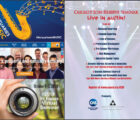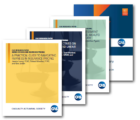What do actuaries do? The answer used to be simple: ratemaking and reserving. But today’s times aren’t simple. Technology has begun to make disruptive inroads into insurance, especially actuarial science. What does the future hold for actuaries — and how can they adapt to a changing world?
Two sessions at the 2018 CAS Annual Meeting explored how data science and technology are impacting actuarial science — and showed that, while actuaries now have access to new tools and new opportunities, the profession can’t become complacent.
Will data scientists come to replace actuaries? Hardly.
Is everyone just a data scientist now?
As an actuary, you are probably hearing constantly that data science is the wave of the future and it’s time to get with the program. Most industries — including insurance — have begun harnessing the power of insightful and useful data to drive innovation. Data scientists are helping carriers innovate throughout the insurance value chain. Will data scientists come to replace actuaries? Hardly.
In the CAS Annual Meeting session “A Tale of Two Analytics Tribes — Actuary vs. Data Scientist,” Stephen J. Mildenhall, FCAS, MAAA, CSPA, assistant professor at St. John’s University’s School of Risk Management, clarified that actuarial science is a profession. As a profession, it operates within an established framework to answer specific questions about risk. These questions are unavoidable: Reserving and ratemaking are essential foundations of insurance.
Data science, on the other hand, is not a profession. Rather, as Frank Palmer, senior expert with McKinsey & Company, noted, data science is a broad spectrum of skill sets. These skills can be applied in a wide variety of roles and to address a wide range of questions — not all related to risk.
Calling “data science” a skill set may seem like a vague definition. As Mildenhall jokingly put it, “Data science is a marketing term to boost your salary by 20 percent.” But in an insurance context, data scientists apply analytical tools to everything insurers do, from underwriting risks to identifying fraudulent claims. Shane Barnes, FCAS, CSPA, assistant vice president of data science at The Hartford, argued that nowhere is applying data science to insurance more critical than finding solutions to customer-focused problems. Per Barnes, data science is all about making the insurance product more customer-centric.
“Designations have no meaning to people in tech … It’s up to us as individuals and as an actuarial society to make it clear that we’re more than what we study.” — Joshua Pyle, FCAS
Few think “customer-centric” when they think “actuary.” But Barnes argued that this is precisely where actuaries can make a profound mark and reposition themselves. “Actuaries are business professionals who understand the [business] problem,” he said. “Data scientists can struggle to get the actual data science to work because they don’t understand the business problem. Actuaries make strong data scientists because of that.”
So should everyone just become a data scientist? Mildenhall, Barnes, and Palmer all agreed that this is perhaps the wrong question to ask. The real question is, how can actuaries leverage data science technology and techniques to enhance their own professional capabilities? As Mildenhall pointed out, actuaries have a responsibility to work within CAS standards and regulatory constraints. “When we think about data science and possible synergies with actuarial science, it is important to consider if the work needs to pass regulatory review,” he said.
But if data science tools can help actuaries be better at ratemaking, then these tools should be embraced. Barnes said, for example, that actuaries can use analytics to determine loss drivers — and can then offer better solutions for their company and customers. “For actuaries, data science offers a huge opportunity to retool and refocus on the customer,” he said.
Actuaries are professionals with strict professional responsibilities, but, if anything, that means they can — and should — develop some of the skill sets expected of data scientists. “Say goodbye to Excel and embrace Python,” Barnes joked. Mildenhall agreed: Actuaries “have to move away from living in Excel. If that’s the only tool you know, then that’s a disaster.” This is especially true for new, younger actuaries, who will (perhaps inevitably) be expected to use data science tools.
Actuarial science is a versatile skill set, too
But if actuarial science is an insurance profession, does that limit actuaries to working in insurance?
Absolutely not. Actuaries can do many things, such as working for technology companies, as panelists at the “Silicon Valley: Actuaries in Tech” session unanimously (and resoundingly) agreed. And they would know. They’re all Fellows working for technology companies:
- Frank Chang, FCAS, director of insurance and safety analytics at Uber.
- Gregory Ryslik, FCAS, vice president at Mindstrong, a health care innovation company.
- Joshua Pyle, FCAS, actuarial director at CyberCube, a cyberrisk analytics company.
- Anita Sathe, FCAS, chief strategy officer at CoverHound, an insurance comparison shopping company.
“We’re kind of everywhere,” Chang said about actuaries in the tech world. Actuaries, he argued, are not unlike consultants: They can wear many hats and can solve many types of problems. “You have to be an insurance expert. You have to be a data scientist to solve technical problems. When you go into tech, people don’t know what an actuary does; you can define it for them,” said Chang.
Pyle went even further, arguing that actuarial science is a profession and a skill set — a skill set that, like data science, “can apply to any number of roles [that] don’t have to be insurance-related”. An open-minded approach to being an actuary is crucial to succeeding outside of the insurance industry. “Don’t draw strict boundaries around what you can do or what you should be doing,” he said.
“Stop seeing threats as threats … and start seeing threats as opportunities. Insurance is going to evolve to be more tech-savvy. Actuaries can be at the forefront of that.” — Anita Sathe, FCAS
Being versatile and open-minded can be hard, especially in the professionalized world of actuarial science, with well-defined designations and competencies. But flexibility is necessary. “Designations have no meaning to people in tech,” Pyle said. “It’s up to us as individuals and as an actuarial society to make it clear that we’re more than what we study.”
Other speakers agreed. “We need to prove the value of actuaries outside pure insurance work,” said Chang. Ryslik stressed the importance of being adaptable: “In tech, you develop a tolerance for risk and the confidence to take risks. And if something doesn’t work, you need to be able to fail fast and fix the issue.” Actuaries can also carve out a niche for themselves: “You end up being the [insurance] expert because you’re the only one who knows insurance,” said Ryslik.
Sathe argued that actuaries may need to change their mindsets completely. “Stop seeing threats as threats,” she said, “and start seeing threats as opportunities. Insurance is going to evolve to be more tech-savvy. Actuaries can be at the forefront of that.” Part of that will be learning data science tools, such as Python or R. “I think there has to be an effort to push people to learn the tools that will keep us relevant,” said Pyle.
The CAS has already begun offering these opportunities to its members: Its new offshoot The CAS Institute offers a Certified Specialist in Predictive Analytics (CSPA) certification — and for good reason. As both CAS Annual Meeting sessions demonstrated, the future of the actuary will be dynamic and ever-changing — and actuaries will need to be ready to seize the opportunities that await.
Lucian McMahon, CPCU, ARM-E, AU-M, is a senior research specialist at the Insurance Information Institute in New York City.













